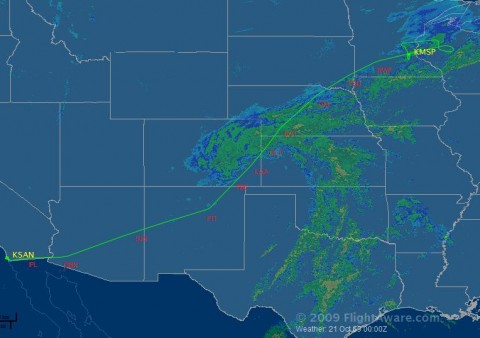Maybe I’m just being hyper-critical here, but an aircraft being out of communication with air traffic control “over two states” does not equate with the claimed “heightened sense of vigilance”. Especially as “worried officials alerted National Guard jets to go after the airliner from two locations, although none of the military planes got off the runway”:
A report released by airport police Friday identified the pilot as Timothy B. Cheney and the first officer as Richard I. Cole. The report said the men were “co-operative, apologetic and appreciative” and volunteered to take preliminary breath tests that were zero for alcohol use. The report also said the lead flight attendant told police she was unaware of any incident during the flight.
The pilots, both temporarily suspended, are to be interviewed next week by investigators of the National Transportation Safety Board. The airline, acquired last year by Delta Air Lines, also is investigating. Messages left at both men’s homes were not immediately returned.
Investigators do not know whether the pilots may have fallen asleep, but NTSB spokesman Keith Holloway said Friday that fatigue and cockpit distraction will be looked into. The plane’s flight recorders were brought to the board’s Washington headquarters.
Voss, the Flight Safety Foundation president, said a special consideration was that the many safety checks built into the aviation system to prevent incidents like this one, or to correct them quickly, apparently were ineffective until the very end. Not only were air traffic controllers and other pilots unable raise the Northwest pilots for an hour, but the airline’s dispatcher should have been trying to reach them as well. The three flight attendants onboard should have questioned why no preparations for landing were ordered. Brightly lit cockpit displays should have warned the pilots it was time to land. Despite cloudy weather, the city lights of Minneapolis should have clued them in that they had reached their destination.
I don’t know how involved a discussion has to be to get you to ignore your duties for that long, but if I were in charge of either air traffic control (ATC) or inteceptor aircraft for central North America, I’d be asking very pointed questions of my subordinates. A large commercial passenger aircraft should not be out of contact with sequential ATC points without some alarms being raised . . . yes, it could be communication equipment failure, but after 9/11, any unexpected communications failure with commercial aircraft should have raised red flags. The reported lack of scrambled interceptor aircraft implies either bureaucratic incompetence or criminal negligence.
As one or two people have pointed out, the flight was headed into non-critical airspace (Wisconsin, then Ontario), so perhaps the perceived need to scramble fighters was lower than if the flight profile had deviated toward Chicago or somewhere “important”.
Update: Doug Church of the National Air Traffic Controllers Association provides a clarification in the comments.
Update, 13 November: FAA indicates that air traffic controllers should have alerted NORAD much earlier than they did.





As the author of the quote referenced above (air traffic controllers’ “heightened sense of vigilance”) I will clarify that I was referring to the actions taken by controllers at Minneapolis Center both right before and after radio contact was re-established with the Northwest pilots. We now are trained to think of all possible scenarios and take all steps necessary to ensure that pilots are in full control of their aircraft. Meanwhile, other FAA personnel in the facility notify all relevant authorities on the ground and in the military. That’s the “vigilance” as I described. While a pilot is NORDO (no radio contact) and we attempt to re-connect with the crew, controllers are trained to follow the flight closely on radar to monitor its progress and ensure that no other aircraft are affected as a traffic conflict.
-Doug Church
National Air Traffic Controllers Association
Washington, D.C.
Comment by Doug Church — October 24, 2009 @ 09:39
Doug, thanks for providing that clarification. I see what you were addressing specifically was the controllers’ responsibility, not the overall civil-and-military co-ordination. I’m still puzzled that the military didn’t get off the runway, but that’s clearly not under the control of civilian controllers at the airport.
Comment by Nicholas — October 24, 2009 @ 11:08